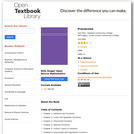
Open source precalculus textbook.
- Subject:
- Calculus
- Mathematics
- Material Type:
- Textbook
- Provider:
- Stitz-Zeager Open Source Mathematics
- Author:
- Carl Stitz
- Jeff Zeager
- Date Added:
- 07/15/2011

Open source precalculus textbook.
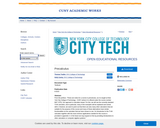
From the preface, "These are notes for a course in precalculus, as it is taught at New York City College of Technology - CUNY (where it is offered under the course number MAT 1375). Our approach is calculator based. For this, we will use the currently standard TI-84 calculator, and in particular, many of the examples will be explained and solved with it. However, we want to point out that there are also many other calculators that are suitable for the purpose of this course and many of these alternatives have similar functionalities as the calculator that we have chosen to use. An introduction to the TI-84 calculator together with the most common applications needed for this course is provided in appendix A. In the future we may expand on this by providing introductions to other calculators or computer algebra systems."
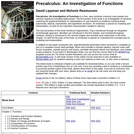
Precalculus: An Investigation of Functions is a free, open textbook covering a two-quarter pre-calculus sequence including trigonometry. The first portion of the book is an investigation of functions, exploring the graphical behavior of, interpretation of, and solutions to problems involving linear, polynomial, rational, exponential, and logarithmic functions. An emphasis is placed on modeling and interpretation, as well as the important characteristics needed in calculus.

Open Textbooks for Rural Arizona participants are invited to remix this template to share their courses, textbooks, and other OER material on our Hub.
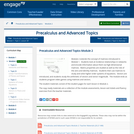
Module 2 extends the concept of matrices introduced in Module 1. Students look at incidence relationships in networks and encode information about them via high-dimensional matrices. Matrix properties are studied as well as the role of the zero and identity matrices. Students then use matrices to study and solve higher order systems of equations. Vectors are introduced, and students study the arithmetic of vectors and vector magnitude. The module ends as students program video games using matrices and vectors.
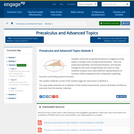
Students revisit the fundamental theorem of algebra as they explore complex roots of polynomial functions. They use polynomial identities, the binomial theorem, and Pascals Triangle to find roots of polynomials and roots of unity. Students compare and create different representations of functions while studying function composition, graphing functions, and finding inverse functions.
Find the rest of the EngageNY Mathematics resources at https://archive.org/details/engageny-mathematics.
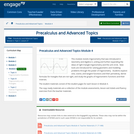
This module revisits trigonometry that was introduced in Geometry and Algebra II, uniting and further expanding the ideas of right triangle trigonometry and the unit circle. New tools are introduced for solving geometric and modeling problems through the power of trigonometry. Students explore sine, cosine, and tangent functions and their periodicity, derive formulas for triangles that are not right, and study the graphs of trigonometric functions and their inverses.
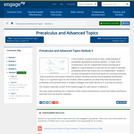
In this module, students build on their understanding of probability developed in previous grades. In Topic A the multiplication rule for independent events introduced in Algebra II is generalized to a rule that can be used to calculate probability where two events are not independent. Students are also introduced to three techniques for counting outcomes. Topic B presents information related to random variables and discrete probability distributions. Topic C is a capstone topic for this module, where students use what they have learned about probability and expected value to analyze strategies and make decisions in a variety of contexts.

The goals of this course are to give students a greater knowledge and understanding of mathematics and to help students develop new skills and concepts and enhance their problem-solving ability, all of which are necessary for the study of a science and engineering oriented calculus. MAT 196 is also designed to help students further develop and extend their critical thinking skills in a contextualized environment. You will achieve this goal by applying strategies presented by the instructor which are designed to help you interpret, analyze, evaluate, infer, and synthesize concepts studied in preparation for Calculus.
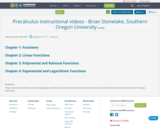
These instructional videos cover the Examples and Try It exercises in the OpenStax Precalculus text. Created by Brian Stonelake at Southern Oregon University.

(Nota: Esta es una traducción de un recurso educativo abierto creado por el Departamento de Educación del Estado de Nueva York (NYSED) como parte del proyecto "EngageNY" en 2013. Aunque el recurso real fue traducido por personas, la siguiente descripción se tradujo del inglés original usando Google Translate para ayudar a los usuarios potenciales a decidir si se adapta a sus necesidades y puede contener errores gramaticales o lingüísticos. La descripción original en inglés también se proporciona a continuación.)
El módulo 2 extiende el concepto de matrices introducidas en el módulo 1. Los estudiantes analizan las relaciones de incidencia en las redes y codifican información sobre ellas a través de matrices de alta dimensión. Se estudian las propiedades de la matriz, así como el papel de las matrices cero y de identidad. Luego, los estudiantes usan matrices para estudiar y resolver sistemas de ecuaciones de orden superior. Se introducen vectores y los estudiantes estudian la aritmética de los vectores y la magnitud del vector. El módulo termina cuando los estudiantes programan videojuegos usando matrices y vectores.
English Description:
Module 2 extends the concept of matrices introduced in Module 1. Students look at incidence relationships in networks and encode information about them via high-dimensional matrices. Matrix properties are studied as well as the role of the zero and identity matrices. Students then use matrices to study and solve higher order systems of equations. Vectors are introduced, and students study the arithmetic of vectors and vector magnitude. The module ends as students program video games using matrices and vectors.

(Nota: Esta es una traducción de un recurso educativo abierto creado por el Departamento de Educación del Estado de Nueva York (NYSED) como parte del proyecto "EngageNY" en 2013. Aunque el recurso real fue traducido por personas, la siguiente descripción se tradujo del inglés original usando Google Translate para ayudar a los usuarios potenciales a decidir si se adapta a sus necesidades y puede contener errores gramaticales o lingüísticos. La descripción original en inglés también se proporciona a continuación.)
Los estudiantes vuelven a visitar el teorema fundamental del álgebra mientras exploran raíces complejas de funciones polinomiales. Utilizan identidades polinomiales, el teorema binomial y el triángulo de Pascal para encontrar raíces de polinomios y raíces de la unidad. Los estudiantes comparan y crean diferentes representaciones de funciones mientras estudian composición de funciones, gráficos de funciones y encuentran funciones inversas.
Encuentre el resto de los recursos matemáticos de Engageny en https://archive.org/details/engageny-mathematics.
English Description:
Students revisit the fundamental theorem of algebra as they explore complex roots of polynomial functions. They use polynomial identities, the binomial theorem, and Pascals Triangle to find roots of polynomials and roots of unity. Students compare and create different representations of functions while studying function composition, graphing functions, and finding inverse functions.
Find the rest of the EngageNY Mathematics resources at https://archive.org/details/engageny-mathematics.

(Nota: Esta es una traducción de un recurso educativo abierto creado por el Departamento de Educación del Estado de Nueva York (NYSED) como parte del proyecto "EngageNY" en 2013. Aunque el recurso real fue traducido por personas, la siguiente descripción se tradujo del inglés original usando Google Translate para ayudar a los usuarios potenciales a decidir si se adapta a sus necesidades y puede contener errores gramaticales o lingüísticos. La descripción original en inglés también se proporciona a continuación.)
Este módulo revisa la trigonometría que se introdujo en la geometría y el álgebra II, uniendo y ampliando aún más las ideas de la trigonometría del triángulo recto y el círculo unitario. Se introducen nuevas herramientas para resolver problemas geométricos y de modelado a través del poder de la trigonometría. Los estudiantes exploran funciones sinuso, coseno y tangentes y su periodicidad, derivan fórmulas para triángulos que no son correctos y estudian los gráficos de las funciones trigonométricas y sus inversos.
English Description:
This module revisits trigonometry that was introduced in Geometry and Algebra II, uniting and further expanding the ideas of right triangle trigonometry and the unit circle. New tools are introduced for solving geometric and modeling problems through the power of trigonometry. Students explore sine, cosine, and tangent functions and their periodicity, derive formulas for triangles that are not right, and study the graphs of trigonometric functions and their inverses.

(Nota: Esta es una traducción de un recurso educativo abierto creado por el Departamento de Educación del Estado de Nueva York (NYSED) como parte del proyecto "EngageNY" en 2013. Aunque el recurso real fue traducido por personas, la siguiente descripción se tradujo del inglés original usando Google Translate para ayudar a los usuarios potenciales a decidir si se adapta a sus necesidades y puede contener errores gramaticales o lingüísticos. La descripción original en inglés también se proporciona a continuación.)
En este módulo, los estudiantes se basan en su comprensión de la probabilidad desarrollada en calificaciones anteriores. En el tema A, la regla de multiplicación para eventos independientes introducidos en el álgebra II se generaliza a una regla que puede usarse para calcular la probabilidad donde dos eventos no son independientes. Los estudiantes también se introducen a tres técnicas para contar los resultados. El tema B presenta información relacionada con variables aleatorias y distribuciones de probabilidad discretas. El Tema C es un tema Capstone para este módulo, donde los estudiantes usan lo que han aprendido sobre la probabilidad y el valor esperado para analizar estrategias y tomar decisiones en una variedad de contextos.
English Description:
In this module, students build on their understanding of probability developed in previous grades. In Topic A the multiplication rule for independent events introduced in Algebra II is generalized to a rule that can be used to calculate probability where two events are not independent. Students are also introduced to three techniques for counting outcomes. Topic B presents information related to random variables and discrete probability distributions. Topic C is a capstone topic for this module, where students use what they have learned about probability and expected value to analyze strategies and make decisions in a variety of contexts.

The Quadratics module is divided into 4 parts, including (1) solving by factoringm, (2) solving using the square root property and completing the square, (3) solving using the quadratic formula, and (4) solving by graphing. The goal is for students to recognize the strategies for solving quadratics, and even higher degree functions that can employ the same strategies. For each strategy there is a video page and then a practice homework page. The video pages include printable word documents that are the notes. Each video page is followed by a practice homework page in Derivita.This work, by Cheryl Meilbeck, is licensed under a Creative Commons Attribution 4.0 International License.Links to an external site.CC-BY

Review of Precalculus - version 4: http://www.stitz-zeager.com/Precalculus4.pdf

Exploration assignments of transformations with both Algebra 2 parent functions and Trigonometric Functions.
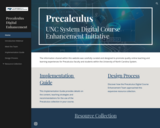
The information shared within this website was carefully curated and designed to promote quality online teaching and learning experiences for Precalculus faculty and students within the University of North Carolina System.

Precalculus course collection video from the UNC System OER project. This one-minute video is meant for students. It focuses on what students may think they know about the topic, what students could learn from taking the course, and a brief introduction to open educational resources.